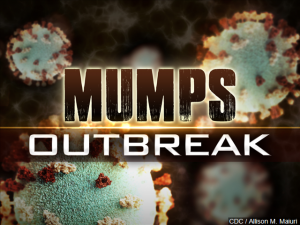 State health officials say at least 19 students and staff members at James Madison University have the mumps, and lab results are pending for three other students. The Health Department urges members of the JMU community to review their immunization status and to contact their health care providers as needed to receive a vaccine.
State health officials say at least 19 students and staff members at James Madison University have the mumps, and lab results are pending for three other students. The Health Department urges members of the JMU community to review their immunization status and to contact their health care providers as needed to receive a vaccine.
From the Virginia Department of Health: The Harrisonburg-Rockingham Health Department continues to investigate an ongoing mumps outbreak at James Madison University (JMU). To date, mumps infections have been confirmed by lab testing in five staff members and 14 students. Lab results are currently pending for three additional students. The health department also is investigating several additional cases in the region that are apparently unrelated to JMU.
Mumps is an acute viral disease that is transmitted from person to person through direct contact with respiratory droplets spread by coughing and sneezing, or through contact with saliva from an ill person. Persons with mumps may have body aches, fever and swollen glands in the jaw. Most people recover from the illness in a week, but serious complications are possible. To protect yourself from diseases like mumps that are spread through droplet contact, wash your hands frequently, cover your nose or mouth when you cough or sneeze and avoid droplet contact with people who are ill. Don’t share cups or utensils and avoid close contact with people who are ill.
The health department is advising students and community members to review their immunization status and contact their health care provider to receive vaccine as needed. The Measles, Mumps and Rubella vaccine (MMR) is usually given when a child is 1 year old and again between the ages of 4 and 6 years. The mumps vaccine is 88 percent effective in people who receive two doses, but some fully immunized individuals may still develop mumps. A third dose of MMR vaccine may be recommended for individuals at high risk for infection due to close contact with someone who has mumps.
People exposed to mumps may not show symptoms for 12 to 25 days, but infected individuals are able to transmit the infection to others up to two days before symptoms appear. If you have mumps-like symptoms or questions about your mumps immunizations, contact your health care provider. The health department and JMU will provide additional updates as new information becomes available or recommendations arise.



